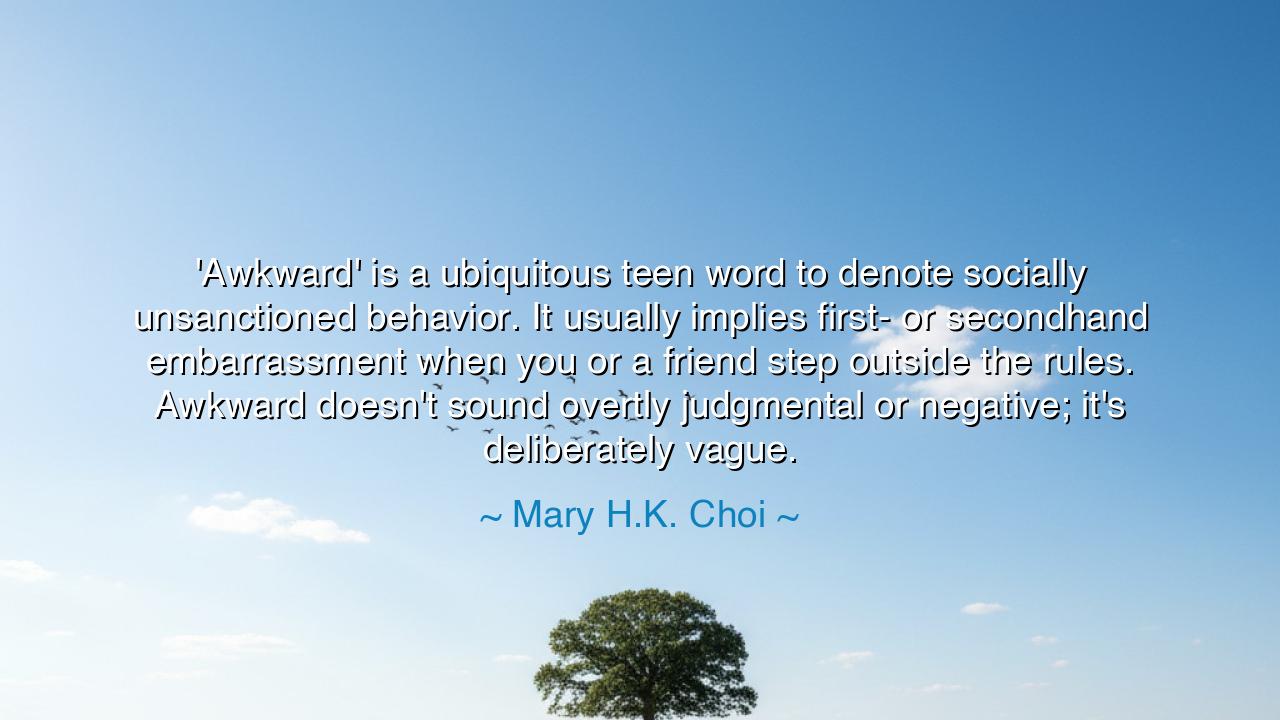
'Awkward' is a ubiquitous teen word to denote socially
'Awkward' is a ubiquitous teen word to denote socially unsanctioned behavior. It usually implies first- or secondhand embarrassment when you or a friend step outside the rules. Awkward doesn't sound overtly judgmental or negative; it's deliberately vague.






Hearken, O children of the ages, to the words of Mary H.K. Choi, who illuminates the subtle power of a single word in the life of youth: awkward. She observes that this term serves as a delicate instrument, marking moments of social transgression, a gentle signal that one has stepped outside the invisible rules of the teen world. Unlike harsh condemnation, awkward conveys embarrassment, discomfort, and deviation without casting permanent judgment—a mirror reflecting the tender vulnerabilities of adolescence.
Since time immemorial, societies have maintained codes of conduct, visible and invisible, by which the young measure themselves. In ancient Athens, the youth attending festivals or debates navigated subtle social expectations, aware that missteps could invite laughter or scorn. Yet, unlike blunt rebuke, gestures, expressions, or murmured phrases served as soft guidance, much as Choi describes: a way to indicate impropriety without crushing the spirit. Awkward functions in the same manner—a linguistic nod to boundaries, signaling the edge of social grace without violence to the self.
Consider the story of a young scribe in medieval China, whose first public recitation of a poem elicited titters from peers. The word for misstep was not harsh; it signified the scribe’s departure from expected behavior, the blush of error marking a lesson rather than condemnation. Like this scribe, teens today encounter the word awkward in moments of misaligned behavior, often shared first- or secondhand, as embarrassment spreads through observation, binding communities in empathy and recognition.
Choi’s reflection also speaks to the deliberate vagueness of the term. Awkward does not specify the nature or degree of error; it leaves room for interpretation, allowing social lessons to be absorbed gently. The ancients understood this subtlety in their own teachings, using parables, fables, and indirect admonishments to shape behavior. The ambiguity of the word invites reflection, prompting the young to consider the boundaries of acceptability and the feelings of others without imposing rigid judgment.
This subtle mechanism nurtures empathy and social intelligence. To feel awkward is to perceive both one’s own error and the impact upon peers. It fosters awareness of relational dynamics, an ancient practice crucial to the cohesion of any community. Teenagers who experience or witness awkwardness learn to navigate the delicate architecture of friendship, hierarchy, and cultural expectation, gaining the tools for harmonious engagement in society.
The lesson flows naturally: not every error warrants harsh judgment, and not every social misstep should lead to shame. Language can serve as a gentle guide, shaping behavior while preserving dignity. The word awkward, simple yet profound, teaches that acknowledgment and reflection often surpass punishment, that growth may flourish in the space between correction and compassion.
Practical application emerges from this wisdom. When one observes socially unsanctioned behavior—whether in oneself or others—pause and reflect. Label the moment with kindness, offer subtle guidance, and allow the young or inexperienced to absorb lessons without fear. Encourage open discussion about social norms, empathy, and the consequences of actions, fostering maturity without humiliation.
Thus, heed the enduring teaching of Mary H.K. Choi: the smallest words, wielded with awareness, carry immense power. Awkward is a beacon of social navigation, a bridge between error and understanding, embarrassment and learning. By embracing its nuance, by observing and reflecting upon its subtle signals, we cultivate empathy, discernment, and the graceful art of human connection—a lesson as vital in the courts of the ancients as it is in the corridors of modern youth.






AAdministratorAdministrator
Welcome, honored guests. Please leave a comment, we will respond soon